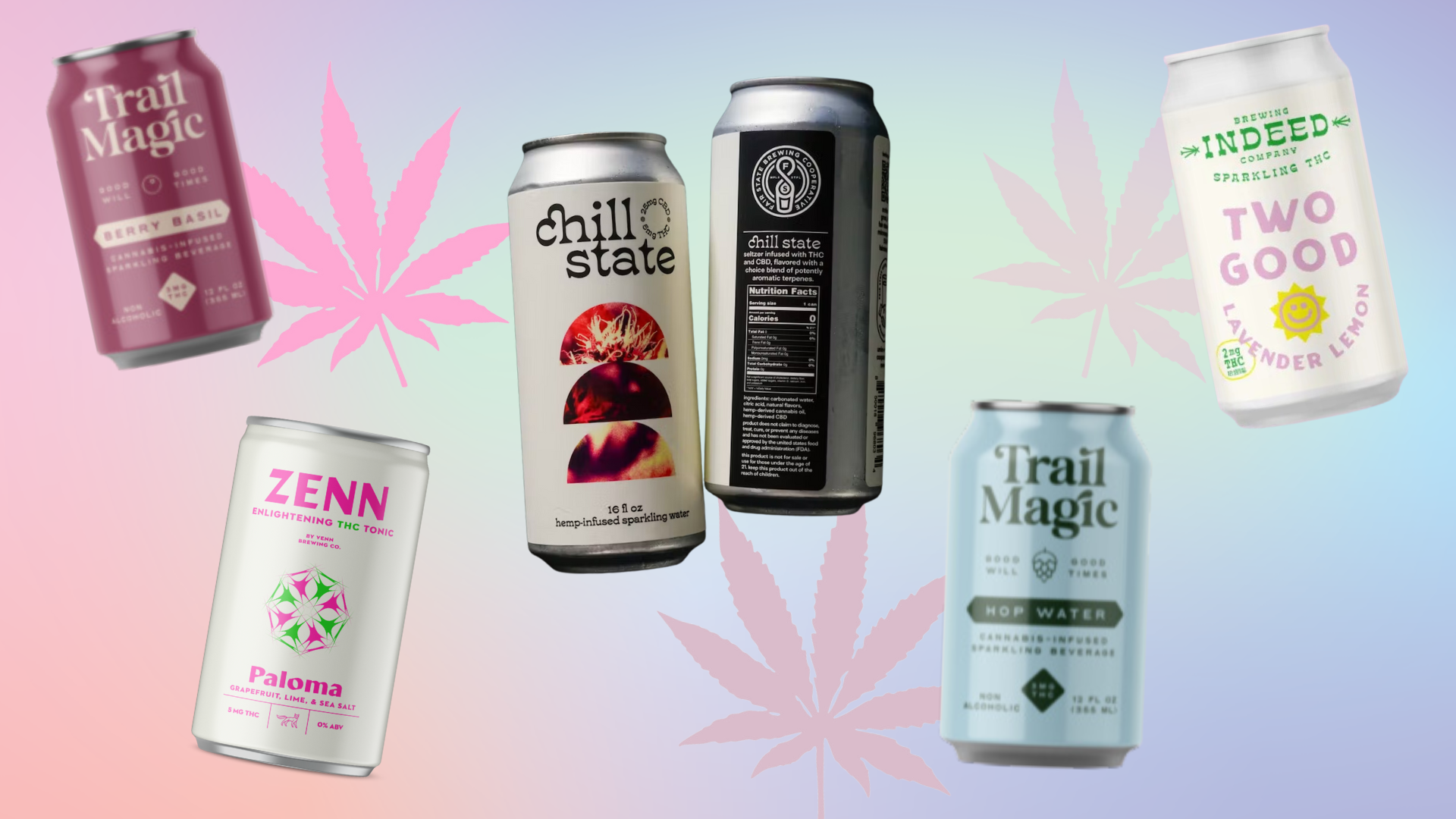Admittedly, Venn Brewing’s Kyle Sisco says, his company’s THC seltzer was a little late to market. When the state law allowing the production and consumption of low-dose edibles went into effect in July, local breweries scrambled to release mood-altering bubbly water brands in the weeks that followed. Venn’s grapefruit paloma tonic, Zenn—infused with 5 mg of Minnesota-grown, hemp-derived Delta 9 THC and real fruit—didn’t hit shelves until late September.
But that hasn’t stopped Zenn from becoming the south Minneapolis brewery’s best-selling offering. The response, Sisco says, has been “overwhelmingly positive.”
“We’re basically selling things as fast as we can make them,” he tells Racket. Zenn is consistently their No. 1 item—beer collectively outpaces it, but it’s the brewery’s single most popular bev by count “pretty much seven days a week.”
Venn is one of more than a dozen Minnesota breweries that have launched THC seltzers since the summer’s surprise legalization. Several—among them Venn, Wild Mind Artisan Ales, Modist Brewing Co., and Fulton—have even expanded their lines with additional flavors, or added new products like THC gummies made with ingredients that compliment their seltzer.
The good news, for marijuana users and producers, is that Gov. Tim Walz said this week he thinks the DFL house/senate/governor trifecta is poised to pass legal weed “by May.” The bad news, for breweries specifically, is that sweeping changes to Minnesota’s unusual and essentially oversight-free edible program are almost certainly on the horizon when the legislature convenes next year—whether we get full marijuana legalization or not.
And that means brewers like Sisco are innovating with caution, carefully allocating their time and resources to THC with an eye toward the fact that this booming market might soon go away.
“Honestly, that’s the primary concern,” he says. “I think everyone pretty much expects full legalization to come sometime in the next year… and we’re all kind of bracing ourselves.”
For Minnesota breweries, the THC windfall couldn’t have come at a better time.
After years of steady growth, 2020 was among the all-time worst in craft beer, which saw a 9% decline in production thanks to COVID-19-related slowdowns and shutdowns. Pandemic problems lingered into 2021, with supply chain issues and shortages driving up the cost of ingredients and materials. And things haven’t gotten much better in 2022—a “make or break year” for the industry—as the breweries’ producer price index started to skyrocket in January and is now at its highest level in three decades.
Combine that with sluggish beer sales and, as Indeed Brewing owner Tom Whisenand says, “It’s really no surprise that there’s a lot of interest and energy and movement towards producing these types of THC things.”
Indeed’s Two Good sparkling THC drinks launched just a month after the law went into effect, thanks in part to their experience in producing a CBD seltzer called Lull back in 2019. But at the end of the day, they’re still a brewery—and you don’t brew seltzer. Whisenand says their year has been full of internal conversations about how THC should factor into the business in the long term.
“We’ve sold a lot of THC beverages in the last six months, or whatever it’s been. But it’s still a single-digit percentage of what we do,” he explains. The vast majority of what Indeed produces and sells is beer, as it has been for their decade-long run. Whisenand thinks that’ll be the case “for a long time to come.” (They’re lucky, he adds, that Indeed hasn’t been hit as hard by sales slowdowns as many other breweries.)
The bottom-line impact is more noticeable at smaller breweries like Venn, which have been able to quickly pivot to producing THC seltzers. “It’s actually considerably less complicated than making beer,” Sisco says. If you have an open tank, then you can turn seltzers around faster, and with less effort and a more minimal investment in ingredients and materials, than you can beer.
One of the Minnesota companies contributing to that ease of production is Superior Molecular, which provides the organic hemp extract used in several locally produced THC seltzers: Modist’s MELT and TINT, Dangerous Man’s Canna Blissed THC Tonic, Bent Paddle’s CBD+ and THC+, and a number of others. Superior Molecular founder John Dugas says that this year has been the biggest ever for their White Bear Lake extraction lab since it was founded in 2017: “The whole thing kind of blew up on the beverage side.”
“Some of our biggest customers, and even our smaller customers, are reporting revenue spikes of like, 24 to 53 percent,” Dugas says. “I think breweries have just been dipping their toe in the water one by one because they almost can't believe it.”
Minnesota’s recent THC free-for-all feels all the more fun when you compare it to the state’s complicated and outdated beer laws. The unexpected (and possibly accidental) legalization has made the current seltzer climate all the more of a gold rush—many brewers suspect that this largely unregulated revenue stream won’t remain that way for much longer. Hell, it might not be around at all much longer.
“It’s probably really, really good in the short term,” Indeed’s Whisenand says. “But I think it’s yet to be seen what the future will bring with these beverages, and with THC as a whole in Minnesota. I think there’s a good possibility that what we’re doing right now will not be what you’re allowed to do in a year.”
Put more bluntly: “If the state does move towards full-on legal recreational marijuana, I think it’s quite possible that they could shut down what we’re doing right now.” As a result, Whisenand says Indeed isn’t planning to make risky investments or bring on new staff members to help build out their THC program—the future is just too murky.
But other breweries, like Fair State Brewing Cooperative nearby in Northeast, have been willing to invest more heavily into THC. After releasing their THC/CBD seltzer, Chill State, in October, Fair State brought Better Beer Society founder Rob Shellman on board as the program director of their newly formed Chill State Collective. He’ll oversee the THC side of things, as Fair State introduces more of its terpene-heavy seltzer strains.
Shellman doesn’t sound too concerned about job security in the seltzer space. “The biggest risk is not taking any risk at all, right? We’re passionate about this category, and that passion helps drive us to take these calculated risks,” he says. Unlike breweries who’ve been hesitant to lean too far into THC, “I’d say, if anything we’re leaning the other way and going all in.”
He adds that Chill State, which has a grassier, earthier flavor than some of the more fruity seltzers around town, has been flying off the shelves: “I believe it was 45% of our to-go revenue leaving the taproom in October and November,” Shellman says. “Pretty incredible.”
Dugas says he’s proud of Superior Molecular’s role in helping breweries, many of which “shut down for COVID and really, really struggled,” get a potentially lifesaving infusion of funds thanks to THC. “This is providing a huge opportunity for these companies to become beverage companies, not just beer companies.”
But he and Whisenand know all too well how quickly the (d)rug can be pulled out from under you. It was Superior Molecular that provided the CBD for Indeed’s initial run of Lull seltzer, which was discontinued not long after it debuted due to objections from the Minnesota Department of Agriculture.
The directive was annoying for Indeed; it almost put Dugas’s company out of business for good. And though they’ve resumed production of Lull thanks to the new state law, the experience has left Whisenand wary.
“It happens really quick: You just get a letter in the mail, and you’ve gotta stop,” he laughs. “You kind of look around like, ‘What can we do about this?’ And the answer is… nothing.”
For four days this December, the Trail Magic THC Taproom brought dozens of locally made seltzer brands and thousands of guests to the former home of now-shuttered Northeast brewery Able (an on-the-nose metaphor for the state of the industry if ever there was one).
Jason Dayton—co-founder of Minneapolis Cider Co. and its corresponding THC seltzer company, Trail Magic—says the weekend-long event, the first of its kind in MN, was a look at a utopian THC future. No one threw up or got cut off. Nobody fought. After days behind the bar, he still has his hearing and his voice; unlike with alcohol, the volume didn’t get out of control.
“That was such an incredible example of what the future of cannabis beverage can look like,” he says. “We sold over 12,000 cannabis beverages in four days. And what was so amazing about this is, we did this for the most diverse group of people I have ever seen in any bar, any brewery, any cidery, any winery, any distillery. It was incredible.”
If Whisenand at Indeed is a bit bearish about the future of THC in Minnesota, Dayton is his bev-bullish counterpart. The devil’s lettuce, he says, is in the details.
Chemically there’s no difference between the hemp- and cannabis-derived THC and CBD, and the effects are the same. The difference is that hemp-derived THC products are federally legal, and have been since the Farm Bill passed in 2018. You can make them in TTB-licensed facilities (which breweries are).
In other words, Dayton argues, recreational cannabis legalization as it exists in states like California and New York is fundamentally different from federal legalization of hemp. His hope is that state lawmakers will see that “all the challenges that we have in the recreational cannabis industry don’t necessarily apply to hemp,” and that they’ll see fit to treat them separately.
“You should be able to go and buy [hemp-derived] products at a grocery store,” he says. “You should be able to buy these products at a liquor store. You should be able to have that consumer access to them.”
Dayton is for full recreational legalization and everything that would come along with it—expungement of criminal records, taxation that would support social programs—as are the other beermakers we talked to for this story. He believes in and supports reasonable regulation and licensing requirements. And he says the relative lack of drama over the last six months, culminating in a statewide-first THC taproom pop-up, is proof that Minnesota can handle it without a draconian increase in regulation.
Plenty of questions remain. Insurance is the next big one: Right now, no carrier is renewing policies that allow for on-premise alcohol and cannabis consumption. “It’s gonna be a problem,” Dayton says. You can currently find Trail Magic at over 150 bars and restaurants around Minnesota, but that could change, as insurance companies have started adding cannabis exclusions to their alcohol policies.
Everyone—even the breweries that are a little more hesitant to leap with both feet into the THC fray—hopes they’ll be allowed to continue producing and selling THC drinks. Breweries and bars already manufacture and distribute controlled substances—wouldn’t that make them among the most qualified?
“I think cannabis suffers from the Nancy Reagan era, still, where it’s seen as this extremely dangerous product, meaning we need extreme regulation on it,” Dayton says. “And that’s just not accurate.”
In fact, he adds, craft beer actually provides a great blueprint in Minnesota that shows how thriving small businesses like breweries can be economic drivers in their communities that help revitalize neighborhoods. Look no further than the now-thriving Lincoln Park district in Duluth, where Bent Paddle has led the charge in making the neighborhood a destination by responsibly, compliantly, and safely selling a legal intoxicant. There’s a chance for THC to do the same.
There’s no getting around the fact that Minnesota’s current edible market is a complete anomaly. In California, for example, the licenses to create or distribute THC products can cost up to $120,000. In Florida, the application fee alone will run you $60,063. Should Minnesota opt not to differentiate between hemp- and cannabis-derived THC, those prices probably won’t be doable for most small businesses, including breweries.
For now, though, the innovation quietly continues. Shellman is a bit coy about their plans at Fair State, but he promises “big things” will be coming out of the Chill State division come 2023.
At Venn, though they have no plans to hire new hemp-loyees or invest heavily into THC, Sisco says they’ll soon add a fruit punch-flavored Pacific Punch tonic, with gummies to match. Venn’s taproom is open as a coffee shop during the day, and they’re getting to work on a cold press coffee with THC that will debut in early 2023. The only real complicating factor so far has been tank space—they’re at max capacity for most of the year on beer alone—but an upcoming switch from crowlers to 16-ounce cans should help alleviate some of that pressure.
“In general, I think Minnesotans are stoked to have a legal source of THC,” Sisco says. “We’re pretty eager to find out what’s gonna happen, honestly. But there’s not a whole lot we can do. We’re not a huge company with a lot of lobbying power. We’re just going to be at the mercy of whatever decision is made.”
"I just want to emphasize the uniqueness of what is happening here in Minnesota right now,” adds Chill State’s Shellman. “Your ability to responsibly consume a cannabis beverage in a social setting—a bar or restaurant—isn’t happening anywhere else in the country and shouldn’t be taken for granted. We have a cool opportunity to lead the nation in what hemp-derived cannabis laws can and should look like.”







